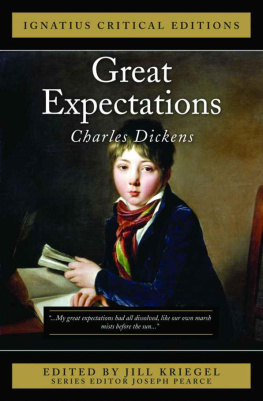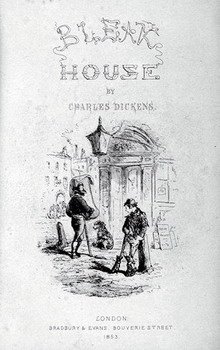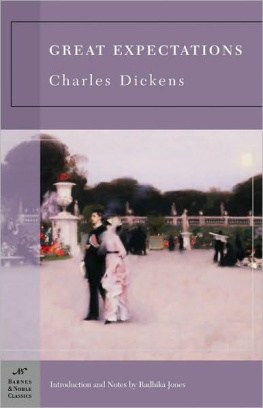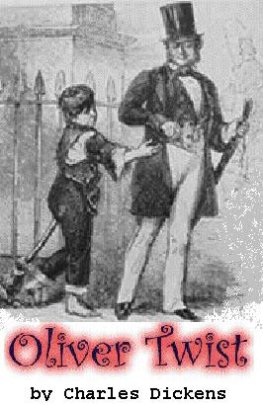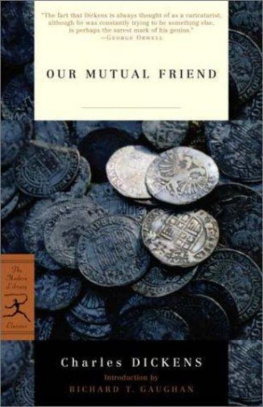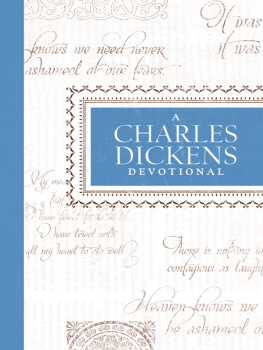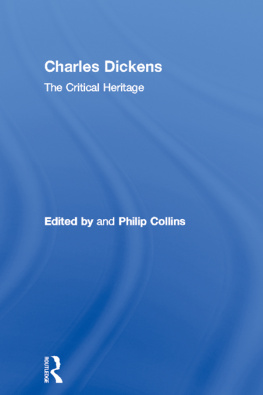Charles Dickens - Great Expectations: Ignatius Critical Editions
Here you can read online Charles Dickens - Great Expectations: Ignatius Critical Editions full text of the book (entire story) in english for free. Download pdf and epub, get meaning, cover and reviews about this ebook. year: 0, genre: Detective and thriller. Description of the work, (preface) as well as reviews are available. Best literature library LitArk.com created for fans of good reading and offers a wide selection of genres:
Romance novel
Science fiction
Adventure
Detective
Science
History
Home and family
Prose
Art
Politics
Computer
Non-fiction
Religion
Business
Children
Humor
Choose a favorite category and find really read worthwhile books. Enjoy immersion in the world of imagination, feel the emotions of the characters or learn something new for yourself, make an fascinating discovery.
- Book:Great Expectations: Ignatius Critical Editions
- Author:
- Genre:
- Year:0
- Rating:5 / 5
- Favourites:Add to favourites
- Your mark:
- 100
- 1
- 2
- 3
- 4
- 5
Great Expectations: Ignatius Critical Editions: summary, description and annotation
We offer to read an annotation, description, summary or preface (depends on what the author of the book "Great Expectations: Ignatius Critical Editions" wrote himself). If you haven't found the necessary information about the book — write in the comments, we will try to find it.
Great Expectations: Ignatius Critical Editions — read online for free the complete book (whole text) full work
Below is the text of the book, divided by pages. System saving the place of the last page read, allows you to conveniently read the book "Great Expectations: Ignatius Critical Editions" online for free, without having to search again every time where you left off. Put a bookmark, and you can go to the page where you finished reading at any time.
Font size:
Interval:
Bookmark:
GREAT EXPECTATIONS
CHARLES DICKENS
With an Introduction
and Contemporary Criticism
Edited by JILL KRIEGEL
Ignatius Critical Editions Editor
JOSEPH PEARCE
IGNATIUS PRESS SAN FRANCISCO
Cover art: Portrait of Julien Boilly ,
c. 1808, oil on canvas by Louis Leopold Boilly.
Photo by R. G. Ojeda.
Collection of Runion des Muses Nationaux, France
Art Resource, N.Y.
Cover design by John Herreid
2010 Ignatius Press, San Francisco
All rights reserved
ISBN 978-1-58617-426-2
Library of Congress Control Number 2010922765
Printed in the United States of America
Tradition is the extension of Democracy through time; it is the proxy of the dead and the enfranchisement of the unborn.
Tradition may be defined as the extension of the franchise. Tradition means giving votes to the most obscure of all classes, our ancestors. It is the democracy of the dead. Tradition refuses to submit to the small and arrogant oligarchy of those who merely happen to be walking about. All democrats object to men being disqualified by the accident of birth; tradition objects to their being disqualified by the accident of death. Democracy tells us not to neglect a good mans opinion, even if he is our groom; tradition asks us not to neglect a good mans opinion, even if he is our father. I, at any rate, cannot separate the two ideas of democracy and tradition .
G. K. Chesterton
Ignatius Critical EditionsTradition-Oriented Criticism for a new generation
Raimund Borgmeier
Crystal Downing
Anthony Esolen
Michael Hanke
Mitchell Kalpakgian
Robert P. Lewis
Regis Martin
INTRODUCTION
Jill Kriegel
Florida Atlantic University
When we contemplate the Dickensian cityand we must, for each novel is not unlike a city unto itselfwe might envision a two-tier London. In this world, the lower tier is peopled by the Sikeses and the Heeps and the Jonas Chuzzlewits, the upper by the Brownlows and the Wickfields and the Tapleys. If we assign the selfishness and arrogance and irreverence of the lower to the earthly city and the charity and humility and reverence of the upper to the Heavenly City, we recognize the Augustinian model, the only destination of salvation, the City that, while on its pilgrimage home, lives a life of righteousness, based on its faith, having the attainment of [Gods] peace in view in every good action it performs in relation to God, and in relation to a neighbor, since the life of a city is inevitably a social life. This City is open to wayfarers seeking to shed their earthly baggage, to amend their lives, to achieve the upper tier through patient and willing service and self-sacrifice.
Charles Dickens was born in 1812. In his childhood home, religion was not a primary focus. His father, a Protestant, was not particularly devout. Charles and his seven siblings were baptized, but they received no formal religious education. His elder sister, Fanny, was quite religious and eventually married an evangelical minister, and Dickens mother too acquired a certain religious zeal. However, rather than fostering in Charles an increased interest in religion, their fervor for the Church as an institution served only to foster his impatience for what he saw as the hypocritical injustices that resulted from human greed and arrogance. In consequence, as a young man, Dickens shunned nominal Christianity, critical of the moral tepidity that he perceived as its complement.
Pope John Paul I described Dickens books as filled with love for the poor and a sense of social regeneration... warm with imagination and humanity. one accepting of worldly limitations and anticipatory of salvation, is the more fitting.
Dickens deep concerns and social conscience echoed in his earlier novels: in Oliver Twist , his horror at the abuses of orphans at the hands of the law and the local church; in Martin Chuzzlewit , his overwhelming concern about greeds damaging consequences, both personal and professional; in Dombey and Son , the ruinous effects of overvalued commercialism; in David Copperfield , through his autobiographical protagonist, the miseries of his own youthowing to his fathers shortcomings and his own subsequent humiliation and lack of education. In all of these, after numerous, often treacherous tests, the hero finally receives palpable, tangible gifts of love and recognition for his goodness. Not so with Pip. An inner call to righteousness beckons him from his ephemeral, sensible world of great expectations and guides him toward the eternal, intelligible world of Truth. True, there is not in Pip an audible happiness at the close of his lifes confession; there is, however, a marked peace and a gratitude for the understanding of the necessary sacrifices from which that peace sprang.
G. K. Chesterton applauded Dickens thirst for things as humble, as human, as laughable as that daily bread for which we cry to God, At the novels close, it is the end of the vacillating and the thankful return to humility that stamp Great Expectations with the Dickensian brand of optimism.
Perhaps one of Chestertons greatest attractions to Dickens was Dickens paradoxical combinations of insistent criticism of the social order and persistent faith in the individual. Interestingly, Dickens father is the initial source of both the chastisement and the hopefulness. It was John Dickens who prompted his sons hope for success when he showed the nine-year-old Charles Gadshill Place and told his smitten son that with hard work he might one day live in such a house. Alongside such blossoms of promise, the seeds of societal concerns were also sown, as Charles endured debtors prison and workhouse drudgery as a result of his fathers financial improvidence. A laissez-faire attitude and a tendency to excess and overgenerosity rendered John Dickens incapable of supporting his family. Yet, despite his failings, he was a faithful, warmhearted, and jovial manqualities that surely become the saving grace of many of his sons role model characters: Samuel Pickwick, Mr. Brownlow, John Jarndyce, Joe Gargery, and even Abel Magwitch, just to name a few. Even in the dismal atmosphere of the Marshalsea prison, John Dickens was known for his optimism, leading a committee to improve conditions for the inmates. His admirable behavior earned him early release, but his continued pecuniary irresponsibility earned him chronic domestic instability. Thus, Charles Dickens youth was a montage of shifting scenesfrom festive gatherings of family and friends to long lonely hours in Warrens Blacking Factory, from bitter-turned-blissful hours reading the beloved books his father gave him to humiliation bred of his familys predicament. In keeping with this ebb and flow of earthly existence, by its very nature susceptible to perpetual change and growth, Dickens creates characters to navigate the worldly channels. To be sure, some characters are better equipped than others, but the joy and value of reading Dickens comes through seeing the motivations and results of their navigation. We look, as Dickens did in his society, for the beacons of hope who can guide the others on a straight path.
Though he was a journalist first and a novelist second, Dickens recognized the great moral potential of fiction, an understanding well elucidated by his works. So many centuries earlier, Augustine also averred the enormous power of literature. While the saint was never a writer of fiction, he employed the plot of his life and its analogues in biblical and classical literature to create from his own particular conversion a timeless lesson in universal truth. Dickens created characters, some of whom would exemplify the path of dark corruption, others who would exemplify the path of light and goodness, and still othersthe group to which Pip belongswho mark a souls journey from one to the other, from dreadful possibility to joyful hope, from the corporeal to the ethereal.
Next pageFont size:
Interval:
Bookmark:
Similar books «Great Expectations: Ignatius Critical Editions»
Look at similar books to Great Expectations: Ignatius Critical Editions. We have selected literature similar in name and meaning in the hope of providing readers with more options to find new, interesting, not yet read works.
Discussion, reviews of the book Great Expectations: Ignatius Critical Editions and just readers' own opinions. Leave your comments, write what you think about the work, its meaning or the main characters. Specify what exactly you liked and what you didn't like, and why you think so.

